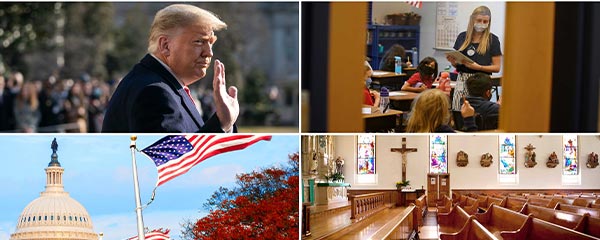About a year ago, George W. Bush was celebrating his re-election with a 51% majority of the popular vote. Much has changed in the meantime, and Bush's job approval rating is hovering in the low 40% range amid continued difficulties in Iraq, concerns about the economy, a White House scandal after the CIA leak, and a failed Supreme Court nomination.
Bush has been able to maintain the loyalties of most Republicans since he took office, although he gave conservative Republicans some possible reasons to be displeased with the nomination of Harriet Miers to the Supreme Court rather than a more credentialed jurist, record budget deficits, and increased government spending. The near-universal rally in support that Bush enjoyed after the 9/11 terrorist attacks faded fairly quickly among Democrats.
Combined Gallup Poll data from post-election 2004 and late September and October 2005 allows for a more detailed comparison than is usually possible of where Bush's job approval rating has changed, spanning the political spectrum from liberal Democrats to conservative Republicans.
In the past year, conservative Republicans have become less likely to approve of Bush, but the decline has been more pronounced among moderate and liberal Republicans and independents.
Bush Approval Ratings, by Party and Ideology
|
|
Nov-Dec 2004 |
Sep-Oct 2005 |
Change |
|
% |
% |
||
|
Overall Approval Average |
52 |
42 |
-10 |
|
|
|
|
|
|
Liberal Democrat |
9 |
7 |
-2 |
|
Moderate Democrat |
14 |
12 |
-2 |
|
Conservative Democrat |
25 |
17 |
-8 |
|
Pure Independent |
42 |
28 |
-14 |
|
Moderate/Liberal Republican |
83 |
69 |
-14 |
|
Conservative Republican |
94 |
87 |
-7 |
All six groups show at least some decline in approval of Bush. Liberal and moderate Democrats have shown the least change, but that is mainly because their support of Bush was so low to begin with.
There have been double-digit decreases in Bush approval ratings among pure independents (those who are independent and do not "lean" toward either party) and moderate and liberal Republicans. Pure independents' support has fallen from 42% to 28%, while moderate and liberal Republicans' support has dropped from 83% to 69%.
Conservative Republicans remain overwhelmingly likely to approve of Bush, but his support among this group has fallen below 90% in the past 11 months.
Implications
Any further significant losses in Bush approval will depend on whether he loses additional Republican support. If Bush lost all remaining support from Democrats (while maintaining his current levels of independent and Republican support), he would still have a 36% job approval rating, only slightly lower than his current 41% reading. If he also lost all support among pure independents as well, his rating would still be 34%. [These estimates also assume no change in the proportion of Republicans, Democrats, and independents in the adult population. If Bush were to lose additional popular support, it would not be unexpected for those party proportions to shift in a more Democratic direction.]
Falling below 40% approval, as Bush did in the Oct. 13-16 CNN/USA Today/Gallup poll, is not uncommon for presidents -- all presidents since Lyndon Johnson have done so. But only four presidents since 1945 -- Harry Truman, Richard Nixon, Jimmy Carter, and the elder George Bush -- have dropped below 30%. If the sitting president were to sink to those depths, he would be doing so because his own partisans were no longer supporting him.
*Data are based on combined samples of 4,036 adults, taken from four polls conducted in November to December 2004, and 4,667 adults, taken from five polls conducted Sept. 26-Oct 30, 2005.
Party and ideology groups are defined as follows:
Liberal Democrats: Self-identify as Democrat or independent who leans to the Democratic Party, and self-identifies as having a liberal ideology. N=748 in 2005, 679 in 2004.
Moderate Democrats: Self-identify as Democrat or independent who leans to the Democratic Party, and self-identifies as having a moderate ideology. N=1,099 in 2005, 808 in 2004.
Conservative Democrats: Self-identify as Democrat or independent who leans to the Democratic Party, and self-identifies as having a conservative ideology. N=391 in 2005, 317 in 2004.
Pure independent: Self-identify as independent and does not lean to either party. N=331 in 2005, 212 in 2004.
Liberal/Moderate Republicans: Self-identify as Republican or independent who leans to the Republican Party, and self-identifies as having a liberal or moderate ideology. Liberal and moderates are combined given the relatively low proportion of liberal Republicans. N=761 in 2005, 641 in 2004.
Conservative Republicans: Self-identify as Republican or independent who leans to the Republican Party, and self-identifies as having a conservative ideology. N=1,270 in 2005, 1,337 in 2004.
